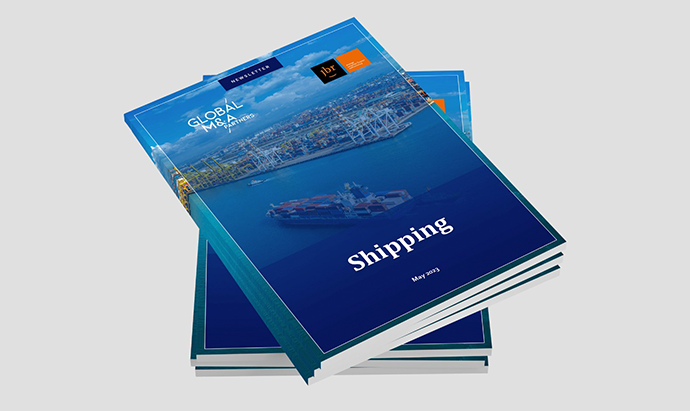Whitepaper
Shipping
This issue addresses these questions. Why is shipping important, what is transported and where, what options do you have as an operator to use your ships as strategically and efficiently as possible, who are the key players?

Towing industry highly resilient
Shipping accounts for 80% of world trade. About 80% of world trade is transported by the shipping industry. This percentage is so high because the international shipping industry is able to transport economically and efficiently over long distances - in fact, it is the most efficient way to move large amounts of cargo over long distances. In the past 20 years, shipping has experienced tremendous growth: global sea trade - calculated as goods loaded worldwide - has increased by 83% in these two decades. Today, goods trade, estimated at $22.3 trillion, contributes 26% of total global GDP (2021).
With trade so dependent on ships and shipping, the maritime transportation industry is a critical part of the global supply chain. Cargo ships worth millions of dollars travel around the world, calling at ports to load or unload their cargoes as quickly as possible. Dry bulk, of which coal, iron ore and grains are the main cargoes, accounts for 45% of total trade. Liquid bulk, which includes crude oil, refined products, chemicals and vegetable oil, accounts for 25% of total trade. Container trade accounts for 15% of the total trade. The remaining 15% consists of trade in livestock, automobiles and persons, exceptional cargoes and other goods.
Asia remains the world's leading maritime cargo region, with over 40% market share in exports and nearly 65% market share in imports. With China opening up after the strict COVID-19 lockdown rules, the economy is expected to grow, boosting imports and exports. China will need dry cargoes such as coal and iron ore for energy and manufacturing, it will need oil and refined oil products, and products manufactured in China will be re-exported.
Meanwhile, the war between Russia and Ukraine has disrupted global supplies of grains, oil and refined petroleum products. New trade routes have emerged, mostly with cargo from a longer distance, which has put pressure on the available fleet. Not beneficial to shippers, but beneficial to owners and operators of dry and liquid bulk carriers, as this pressure on the fleet has increased rates for transportation.
The container sector saw very high freight rates during the COVID-19 years. But this is now over and rates are back to normal, or even lower. Meanwhile, container lines have ordered many new ships during these glorious years, which will be delivered in the coming years. The declining demand for containers combined with the growing fleet will be reflected in rates. Another consequence of the container ship construction boom is the shortage of capacity at shipyards to build other ships, such as dry bulk carriers or tankers.
The industry is transforming itself to be part of a greener and cleaner world. Because it accounts for about 2-3% of the emissions that cause climate change, pressure is mounting on the industry to reduce its carbon footprint. National or regional regulations, rules from associations and organizations, and demand from shippers are drivers for shipping companies to invest in sustainability. However, there is uncertainty about the availability of new fuels and associated infrastructure, technical developments, and the (timing of) regulatory actions that inhibit investment.
Nonetheless, the commitment to a minimum 40% reduction in carbon intensity by 2030 and efforts to achieve a 70% reduction by 2050, both compared to 2008 levels to achieve a net zero carbon target by 2050, and some organizations are even aiming for net zero by 2050, is an important incentive to green the fleet now.
We hope you enjoy reading our newsletter.
Contact the team personally

Margo Blikman
Senior Consultant Research

Rick ter Maat
Partner